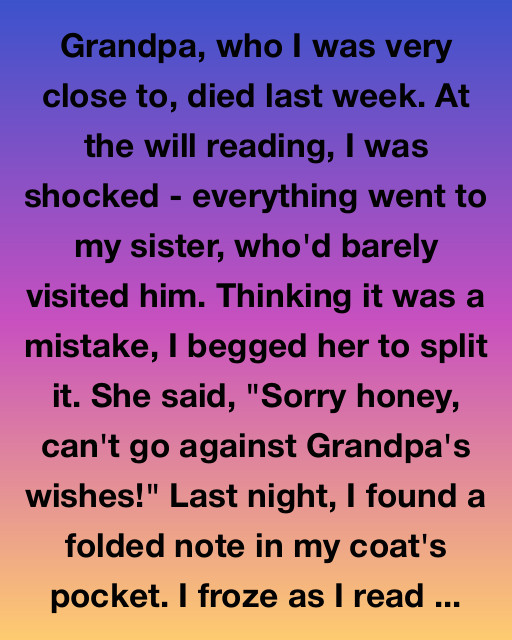Grandpa died last week, and the world went a shade duller. At the will reading, my heart took another hit: everything went to my sister, Carina—the one who stopped by twice a year with store-bought cookies and a selfie. I thought there had to be a mistake. I pulled her aside, begged her to split it.
She smiled like a politician. “Sorry, honey. Can’t go against Grandpa’s wishes.”
I went home empty and buzzing with anger. That night, I reached into my coat for chapstick and touched paper. A folded note. My name on the front in Grandpa’s slanted handwriting.
“If you’re reading this, it means you were the one who stayed close. You showed up when I was lonely, you listened when I rambled. I didn’t leave you anything in the will… yet. Look in the red toolbox in the garage. Bottom drawer. Love you always, kiddo.”
My hands shook. The house was technically Carina’s now. I still had a spare key.
It was just past midnight when I slipped in the back door, careful to miss the loose tile Grandpa always promised to fix. Lemon cleaner and old wood hit me like a memory. The garage was dark; my phone flashlight cut a tinny cone through the cold.
The red toolbox sat exactly where it always had, stubborn as a bull. Bottom drawer—squeak, like it was scolding me—one manila envelope, my name again.
Inside: a longer letter and a small old-fashioned key on a tag: 24B.
“Couldn’t put everything in the will—legal stuff. Go to Greenway Storage, unit 24B. The manager knows you. Show him the key. It’s all yours. Trust yourself. You’ve always had more heart than anyone I’ve known.”
The next morning I called in sick and drove to the far edge of town where storage units go to be forgotten. The manager glanced at the key and nodded, like he’d been waiting for me. He slid up the door to 24B.
Dust floated like confetti in the light. Wooden shelves. Old crates. A motorcycle sleeping under a tarp. And in the center, a locked chest and stacks of journals, spines labeled in Grandpa’s neat caps: 1965 – VIETNAM. 1974 – FIRST BUSINESS. 1987 – MET YOUR GRANDMA. 2002 – YOUR FIRST STEPS.
I sat on the concrete and read until my legs went pins-and-needles. He had written everything down. Failures. Prayers. Tomato harvests. How Carina always kept a foot out the door, how I once asked if we could grow candy instead of vegetables.
The key fit the chest. Inside: thick envelopes of cash. Old coins wrapped in tissue. A velvet ring box. Baseball cards in plastic sleeves that made my stomach flip. A USB drive with a sticky note: FOR YOUR FUTURE.
At home, I plugged it in. The screen lit with Grandpa’s face—tired, twinkly-eyed.
“Hey, kiddo. If you’re seeing this, I’m kicking clouds. Your sister’s probably car shopping already.” He chuckled, then coughed. “I gave her the showy stuff. That’s who she is. But I saved something different for you. Roots. Stories. The good kind of heavy. I didn’t want anyone fighting. This is between you and me. Use it well. You never asked for anything—you just showed up.”
The video ended. For the first time since the funeral, grief loosened its fist a little.
I took weeks to inventory. An appraiser whistled at the baseball cards—north of eighty grand. The coin collection: another twenty. Cash: almost fifty. Tucked between boxes, more journals and a letter explaining how he’d sold a business years ago and squirreled away the proceeds “just in case.”
I didn’t touch a dollar at first. I read him before I counted him.
Then Carina called. “FYI, I’m selling the house—got a great offer,” she said, like she was telling me the weather. “If you ever need to borrow money or crash, let me know.”
“I’m okay,” I said, and meant it.
I used part of the stash to reopen the shuttered café Grandpa used to take me to after dentist appointments. Named it Red Toolbox Café. On the walls: blown-up pages from his journals (copies, not the real ones). At every table, a little card with a quote of his: Grief teaches you to love louder. Show up even when it hurts.
People came for coffee and stayed to read. Strangers left their own notes on a shelf I labeled “Borrowed Courage.” A woman cried quietly over a mug one afternoon and told me a quote on her table felt like it was written for her dad. Local news did a story—“A Café Built on Memories”—and the doorbell started ringing like a heartbeat.
Then Carina walked in.
She took a lap, stood by the shelf, read… and read. Finally she sat down, blinking too fast.
“I never knew him like this,” she said.
“You didn’t visit much,” I said, not unkindly.
“I was always busy,” she whispered. “I didn’t think it mattered.”
“It did.”
She nodded. After a long silence she slid an envelope across the counter. “I sold the house. Bought a condo. There was money left. You should have some.”
I didn’t open it there. It wasn’t about the amount. It was about the first true thing she’d offered me in years.
She came back the next week and asked if she could help. I handed her an apron. We learned each other slowly between latte art and journal margins. She told me her favorite Grandpa story; I told her mine. We laughed about the day he locked himself in the shed and made friends with a spider.
The café grew a children’s writing corner. On Sundays I read one of Grandpa’s entries out loud. People brought their kids, their grief, their grocery lists, and left a little lighter. Sometimes, when the mood was right, I tucked a note into the pocket of a stranger’s coat before they left. Grandpa would’ve loved that.
Three years on, I still talk to him when I count the till. I still find him in the margins he left—how to make a life out of showing up, how to leave more in people than to them.
If you’re missing someone, or sitting on the edge of a locked door in your life, maybe this is your nudge. Open it. It might not be money. It might be better.
And if this found you at the right time—pass it along. You never know who needs a reminder that legacy is less about wills and more about the love we write into each other.


